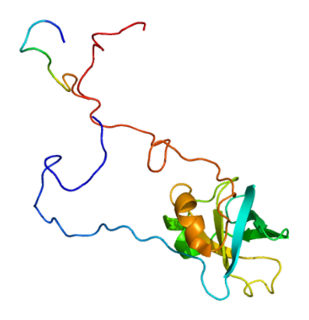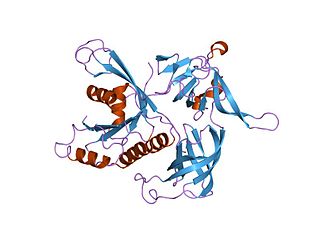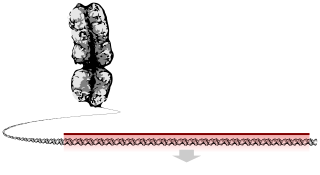Eukaryotic translation is the biological process by which messenger RNA is translated into proteins in eukaryotes. It consists of four phases: initiation, elongation, termination, and recycling.
Eukaryotic elongation factors are proteins very similar to prokaryotic elongation factors.
eEF-1 is a eukaryotic elongation factor.

Eukaryotic translation initiation factor 5A-1 is a protein that in humans is encoded by the EIF5A gene.

Elongation factor 1-delta is a protein that in humans is encoded by the EEF1D gene.

Elongation factor 1-alpha 1 (eEF1a1) is a protein that in humans is encoded by the EEF1A1 gene.
In enzymology, an elongation factor 2 kinase is an enzyme that catalyzes the chemical reaction:

Elongation factor 1-beta is a protein that in humans is encoded by the EEF1B2 gene.

Eukaryotic elongation factor 2 is a protein that in humans is encoded by the EEF2 gene.

Elongation factor 1-alpha 2 is a protein that in humans is encoded by the EEF1A2 gene.

Eukaryotic elongation factor-2 kinase, also known as calmodulin-dependent protein kinase III (CAMKIII) and calcium/calmodulin-dependent eukaryotic elongation factor 2 kinase, is an enzyme that in humans is encoded by the EEF2K gene.

Elongation factor Tu, mitochondrial is a protein that in humans is encoded by the TUFM gene.

Eukaryotic translation initiation factor 2A (eIF2A) is a protein that in humans is encoded by the EIF2A gene. The eIF2A protein is not to be confused with eIF2α, a subunit of the heterotrimeric eIF2 complex. Instead, eIF2A functions by a separate mechanism in eukaryotic translation.

Eukaryotic translation initiation factor 1A, X-chromosomal (eIF1A) is a protein that in humans is encoded by the EIF1AX gene. This gene encodes an essential eukaryotic translation initiation factor. The protein is a component of the 43S pre-initiation complex (PIC), which mediates the recruitment of the small 40S ribosomal subunit to the 5' cap of messenger RNAs.
Eukaryotic Initiation Factor 2 (eIF2) is a eukaryotic initiation factor. It is required for most forms of eukaryotic translation initiation. eIF2 mediates the binding of tRNAiMet to the ribosome in a GTP-dependent manner. eIF2 is a heterotrimer consisting of an alpha, a beta, and a gamma subunit.

In molecular biology, the GTP-binding elongation factor family, EF-Tu/EF-1A subfamily is a family of elongation factors, which includes the eukaryotic eEF-1 and the prokaryotic EF-Tu.
Rck-2 is a gene that plays a major role in clock control of translation. Rck-2 protein is a kinase and is rhythmically activated through phosphorylation events based on the periodicity of the clock. Rck-2 activation is directly associated with the phosphorylation of eEF-2, which is an elongation factor that plays a major role in translation. Phosphorylation of eEF-2 has an inhibitory effect on the activity of translation. Rck-2 is largely studied in Neurospora crassa but has significant homology to humans. Knockout strains have been produced in the model organism N. crassa but there are no human pathologies associated with its deletion. While the basic mechanisms of circadian transcriptional control are known, little is understood about how the clock controls mRNA translation, which makes the characterization of pathways responsible for translational control all the more important.
Eukaryotic translation elongation factor 1 beta 2 pseudogene 1 (eEF1B1) is a protein that in humans is encoded by the EEF1B2P1 gene.
Eukaryotic translation elongation factor 1 beta 2 pseudogene 2 (eEF1B3) is a protein that in humans is encoded by the EEF1B2P2 gene.
Eukaryotic translation elongation factor 1 beta 2 pseudogene 3 (eEF1B4) is a protein that in humans is encoded by the EEF1B2P3 gene.












